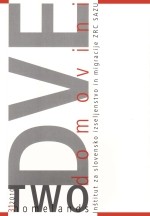Ambivalent identities emerging in transnational migrations between Argentina and Slovenia
Keywords:
transnational migration, ambivalent identities, Argentina, Slovenia, identity politicsAbstract
The article explores the issue of ambivalent identities in transnational migrations between Argentina and Slovenia. Recent migrations between the two states are historically and causally related to political emigration after the Second World War from Slovenia to Argentina and the formation of a diasporic community that asserted complex symbolic links to its homeland. Due to this connection, contemporary migrants can claim and (re)activate their Slovene origin, ‘original’ culture, belonging, citizenship and social identities.
Downloads
References
Appadurai, Arjun (1996). Modernity at Large. Minneapolis: University of Minnesota Press.
Clifford James (1997). Diasporas. The Ethnicity Reader: Nationalism, Multiculturalism and Migration (eds. Montserrat Guibernau and Jon Rex). Cambridge, Oxford and Malden: Polity Press: 283–290.
Constitución … (1860). Constitución de la nacion Argentina, http://www.georgetown.edu/ pdba/Constitutions/Argentina/arg1860.html (12. 10. 2005).
Corsellis, John (1997). The Slovene Political Emigration 1945–1950. Dve domovini/Two Homelands 8: 131–159.
Dežman, Jože (2008). Tranzicijska pravičnost. Poročilo Komisije Vlade Republike Slovenije za reševanje vprašanj prikritih grobišč 2005–2008 (ed. Jože Dežman). Ljubljana: Družina: 251–404.
Elwert, Georg (1995). Boundaries, Cohesion and Switching: On We-Groups in Ethnic, National and Religious Form. MESS, Mediterranean Ethnological Summer School, Vol. 1 (eds. Borut Brumen and Zmago Šmitek). Knjižnica Glasnika Slovenskega etnološkega društva 24. Ljubljana: Slovene Ethnological Society: 105–121.
Eriksen, Thomas Hylland (1999). Tu dimunn pu vini kreol: the Mauritian creole and the concept of creolization, www.transcomm.ox.ac.uk/working%20papers/eriksen.pdf (9. 3. 2004).
Faist, Thomas (2000). The Volume and Dynamics of International Migration and Transnational Spaces. Oxford: Clarendon Press.
Glick Schiller, Nina and Linda Basch (1995). From Immigrant to Transmigrant: Theorizing Transnational Migration. Anthropological Quarterly 68(1): 48–63.
Hannerz, Ulf (1996). Transnational Connections: Culture, People, Places. London and New York: Routledge.
Hannerz, Ulf (1997). Flows, Boundaries and Hybrids: Keywords in Transnational Anthropology, www.transcomm.ox.ac.uk/working%20papers/hannerz.pdf (19. 10. 2005).
Kearney, Michael (1995). The Local and the Global: The Anthropology of Globalization and Transnationalism. Annual Review of Anthropology 24: 547–565.
Lewis, Colin M. (2002). Argentina: A Short History. Oxford: Oneworld.
Lynch, J. et al. (2001). Historia de Argentina. Barcelona: Editorial Crítica.
Munasinghe, Viranjini (2006). Theorizing World Culture through the New World: East Indians and Creolization. American Ethnologist 33(4): 549–562.
Palazón Ferrando, Salvador (1995). Capital humano español y desarrollo económico Latinoamericano: Evolución, causas y características del flujo migratorio (1882–1990). Generalitat Valenciana: Institut de cultura Juan Gil-Albert.
Portes, Alejandro (1997). Immigration Theory for a New Century: Some Problems and Opportunities. International Migration Review 31(4): 799–825.
Povrzanović Frykman, Maja, ed. (2004). Transnational Spaces: Disciplinary Perspectives. Imer: Malmö University.
Rant, Jože, ed. (1998). Zbornik dela v zvestobi in ljubezni – Zedinjena Slovenija 1948–1998. Buenos Aires: Društvo Zedinjena Slovenija.
Repič, Jaka (2004). Migrant ali državljan? Argentinski migranti v transnacionalnem prostoru. Časopis za kritiko znanosti 32(217–218): 223–236.
Repič, Jaka (2006a). »Po sledovih korenin«: Transnacionalne migracije med Argentino in Evropo. Zupaničeva knjižnica št. 19. Ljubljana: Filozofska fakulteta, Univerza v Ljubljani.
Repič, Jaka (2006b). Las migraciones invisibles: Migración transnacional entre Argentina y Europa. Revista de la Facultad de ciencias sociales y jurídicas de Elche 1(1): 233–252.
Safran, Wiliam (1991). Diasporas in Modern Societies: Myths of Homeland and Return. Diaspora 1(1): 83–99.
Schneider, Arnd (2000). Futures Lost: Nostalgia and Identity among Italian Immigrants in Argentina. Oxford et al.: Peter Lang.
Sjekloča, Marko (2004). Čez morje v pozabo: Argentinci slovenskih korenin in rezultati argentinske integracijske politike. Celje: Fit media.
Stolcke, Verena (1995). Talking Culture: New Boundaries, New Rhetorics of Exclusion in Europe. Current Anthropology 36(1): 1–24.
Stolcke Verena and Alexandre Coello, eds. (2008). Identidades ambivalentes en América Latina [siglos XVI–XXI]. Barcelona: Edicions Bellaterra.
Švent, Rozina (2007). Slovenski begunci v Avstriji 1945–1950. Ljubljana: Založba ZRC, ZRC SAZU.
Toplak, Kristina (2008). Buenas Artes: Ustvarjalnost Slovencev in njihovih potomcev v Buenos Airesu. Ljubljana: Založba ZRC, ZRC SAZU.
Vertovec, Stephen (1999). Conceiving and Researching Transnationalism. Ethnic and Racial Studies 22(2): 447–62.
Vertovec, Stephen (2001). Transnationalism and Identity. Journal of Ethnic and Migration Studies 27: 573–82.
Wikan, Unni (2002). Generous Betrayal: Politics of Culture in the New Europe. Chicago: University of Chicago Press.
Downloads
Published
How to Cite
Issue
Section
License

This work is licensed under a Creative Commons Attribution-NonCommercial-NoDerivatives 4.0 International License.
Authors guarantee that the work is their own original creation and does not infringe any statutory or common-law copyright or any proprietary right of any third party. In case of claims by third parties, authors commit their self to defend the interests of the publisher, and shall cover any potential costs.
More in: Submission chapter





